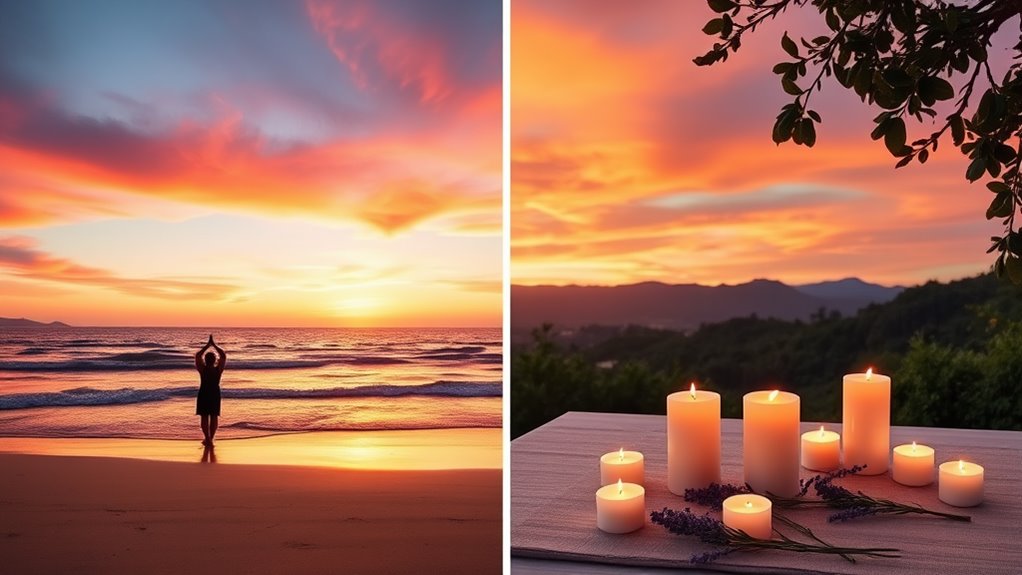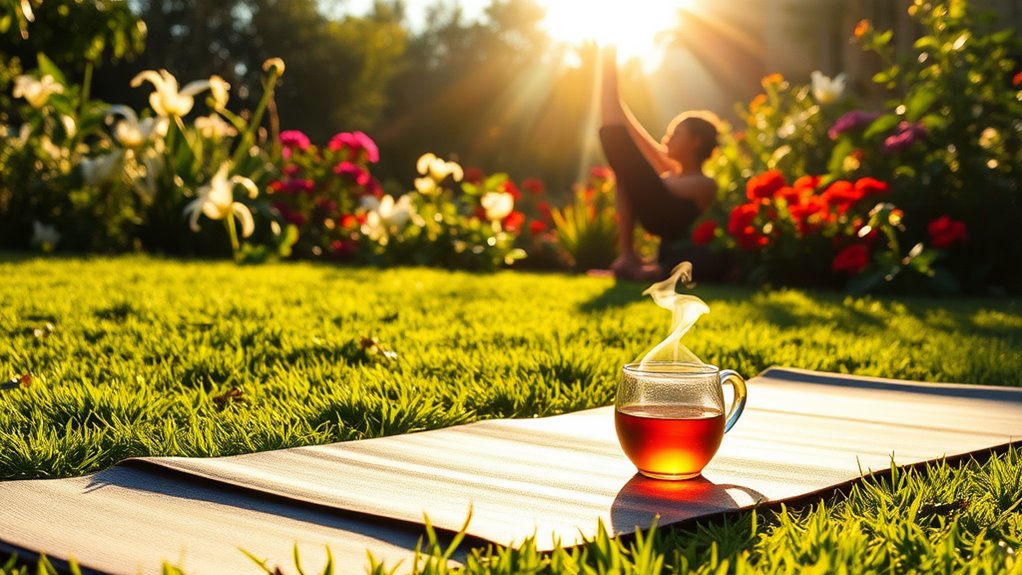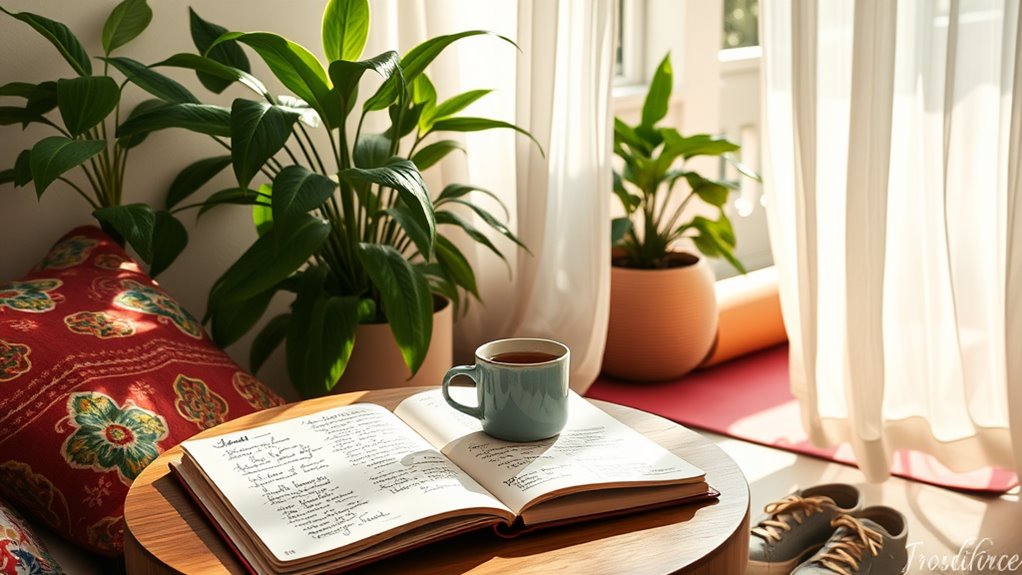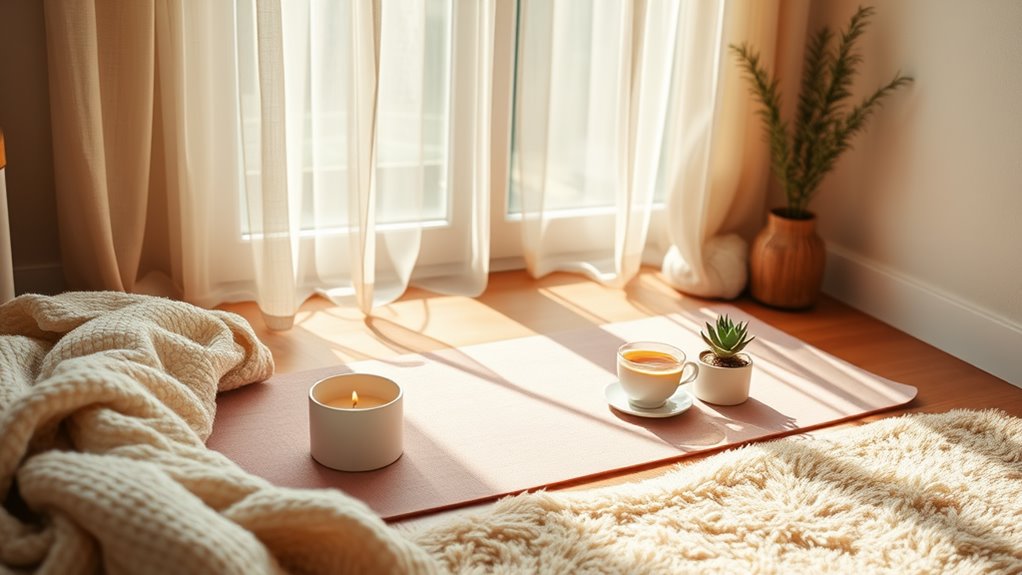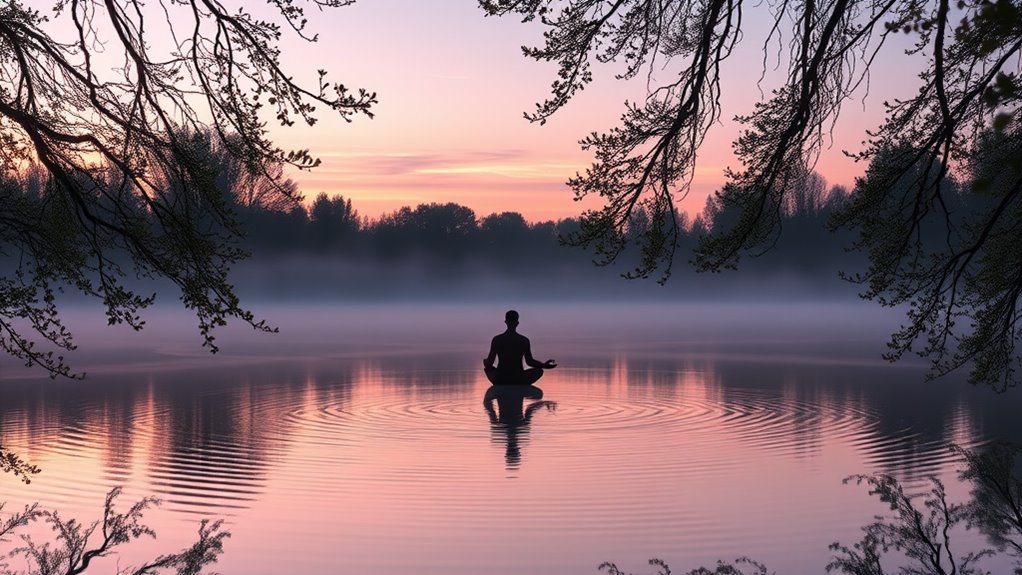Transform Your Body and Mind With These 5 Relaxation Tips
To transform your body and mind, start by practicing mindful breathing; it’ll center your thoughts and reduce stress. Next, incorporate gentle movement like yoga to nurture your body. Explore guided meditation for deeper relaxation and emotional resilience. Create a soothing environment with soft lighting and comfortable furniture, and finally, utilize aromatherapy techniques to enhance your mood. These five tips are just the beginning of your journey to holistic well-being. There’s more to discover!
Key Takeaways
- Practice mindful breathing to center your thoughts and reduce stress by focusing on deep inhalations and slow exhalations.
- Engage in gentle movement activities like yoga or tai chi to nurture your body and enhance mental awareness.
- Explore guided meditation sessions tailored to your goals for deeper self-awareness and emotional well-being.
- Create a soothing environment with decluttered spaces, soft lighting, and cozy furnishings to promote relaxation.
- Utilize aromatherapy with essential oils to elevate mood and foster tranquility in your relaxation routine.
Practice Mindful Breathing
Although life can often feel overwhelming, practicing mindful breathing can help center your thoughts and reduce stress. By focusing on your breath, you invite a profound body and mind relaxation.
Start by finding a quiet space. Inhale deeply through your nose, allowing your diaphragm to expand fully. Hold for a moment, then exhale slowly through your mouth, letting go of tension.
Repeat this process for several minutes, tuning into the sensations of each breath. As distractions arise, acknowledge them without judgment and return your focus to your breathing.
This simple yet powerful practice not only calms the mind but also fosters a deeper connection between your body and spirit, facilitating a greater sense of balance in your daily life. Incorporating breathing techniques into your routine can further enhance your overall well-being.
Incorporate Gentle Movement
After finding calm through mindful breathing, incorporating gentle movement can further enhance your relaxation journey.
Engage in activities like yoga, tai chi, or simple stretching exercises. These practices not only nurture your body but also harmonize the mind. Focus on slow, deliberate movements that foster awareness of your sensations.
Feel the tension release as you shift from one pose to another, grounding yourself in the present moment. Try to synchronize your breath with each movement, deepening your state of relaxation. Incorporating techniques like mindful breathing can significantly amplify the benefits of gentle movement.
As you cultivate this flow, your stress can diminish, leading to heightened clarity and peace. Commit to a routine, even if it’s just ten minutes a day, and observe how gentle movement transforms your overall well-being.
Explore Guided Meditation
As you seek deeper states of relaxation, exploring guided meditation can be a transformative experience. This practice involves focusing your mind while an instructor leads you through visualization and calming techniques. By following these verbal cues, you cultivate mindfulness and enhance your concentration.
Choose sessions that resonate with your personal goals, whether you aim to reduce stress, improve focus, or promote emotional healing. You’ll find various formats, from audio recordings to live classes, allowing you to tailor your experience.
As you engage with guided meditation regularly, you’ll deepen your self-awareness and emotional resilience. Remember, consistency is key; over time, your ability to enter a relaxed state will strengthen, leading to a profound mastery of your mind and body. Additionally, incorporating breath awareness into your practice will further enhance your meditation experience.
Create a Soothing Environment
Creating a soothing environment plays a key role in enhancing your relaxation experience. Begin by decluttering your space; a tidy setting fosters a calm mind. Consider lighting; soft, warm illumination can help create an inviting atmosphere. Incorporate comfortable furniture where you can unwind, and add soft textiles for a cozy touch. To elevate your experience, consider adding elements that mimic a spa, such as essential oils or DIY spa recipes that promote relaxation.
Here’s a quick reference table to guide you:
| Element | Action | Impact |
|---|---|---|
| Declutter | Remove unnecessary items | Promotes mental clarity |
| Lighting | Utilize soft lighting | Enhances comfort |
| Furniture | Choose comfy seating | Encourages relaxation |
| Textiles | Add blankets and cushions | Increases warmth and comfort |
| Nature | Integrate plants | Boosts mood and tranquility |
Utilize Aromatherapy Techniques
While you’re setting the stage for relaxation, incorporating aromatherapy techniques can greatly enhance your experience. Choose essential oils that resonate with your desired mood. Lavender promotes tranquility, while citrus oils invigorate and uplift.
Invest in a quality diffuser to disperse your chosen scent throughout the space. You can also blend oils for personalized effects; consider adding eucalyptus for clarity or chamomile for stress relief.
As you breathe in the aromas, visualize your tension melting away. For a more immersive experience, try topical applications, but always test for skin sensitivity.
Frequently Asked Questions
How Long Should I Practice Each Relaxation Technique Daily?
You should aim to practice each relaxation technique for at least 10 to 15 minutes daily. Consistency’s key, so try to incorporate them into your routine, gradually increasing the time as you become more comfortable.
Can I Combine Different Relaxation Methods Effectively?
Absolutely, you can combine different relaxation methods effectively. By integrating techniques like deep breathing with mindfulness or gentle yoga, you’ll enhance your overall relaxation experience, making it richer and more impactful for your body and mind.
What Are the Benefits of Relaxation for Mental Health?
Relaxation greatly boosts your mental health. It reduces stress, elevates mood, enhances focus, and improves resilience. By incorporating relaxation techniques, you’re strengthening your emotional well-being and equipping yourself to handle life’s challenges more effectively.
Are There Specific Times of Day That Are Best for Relaxation?
Certain times, like morning or before bed, are ideal for relaxation. You can establish a routine during these moments, allowing your mind to unwind and your body to recharge, ultimately enhancing your overall well-being.
How Can I Measure My Progress With Relaxation Practices?
You can measure your progress by tracking your heart rate, stress levels, and overall mood before and after sessions. Journaling your experiences and noting improvements will help you recognize patterns and growth in your relaxation practices.

